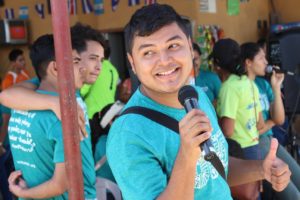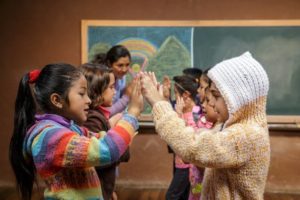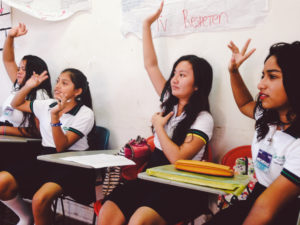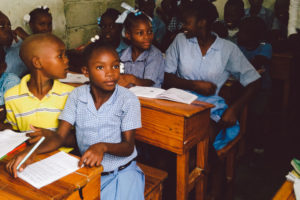Unlocking Opportunity for Youth in Honduras
Organization for Youth Empowerment / El Progreso, Honduras
For many of us, our notion of Honduras is of a country wracked with drug trafficking and gang activity. And it’s true: every single day, young people live in fear of being threatened or recruited by gangs, losing loved ones to violence, or even being killed.

In this difficult environment, Organization for Youth Empowerment (OYE) is fostering a generation of educated young leaders who are committed to improving their communities. OYE’s flagship project is a competitive youth scholarship program that supports promising young people so that they can finish high school and graduate from a university.
Without OYE, many of these scholars would be working instead of getting an education. And even work is often out of reach—a lot of kids living in poverty in Honduras see little hope for the future and turn to drugs and gangs, or attempt the perilous journey north in hopes of making it across the US border. Instead, children at OYE learn how to be leaders and engage their peers through community projects, including a radio station, public arts and graphic design projects, and team sports. All aspects of OYE’s programs are designed and implemented by the kids themselves.
Equally inspiring as its scholars is OYE’s incredibly capable director, Rocío Mendoza. Against so many odds, Rocío doesn’t let anything get her down. Her spirit is a reminder that even in the most dangerous places, children and youth have amazing potential—and it’s our job to give them every opportunity to thrive.
Education with Indigenous Roots
Asociación Educativa Kusi Kawsay / Pisac, Peru
Surrounded by remarkable Incan ruins and stunning mountain views, the town of Pisac, Peru, is rich in Andean history and culture. But sadly, the indigenous children who call Pisac home struggle to get a good start in life. Poverty, discrimination, and an insufficient school system leave children with few opportunities to grow up healthy and educated.
 So, in 2010, a group of local parents set out to provide Pisac’s indigenous children with high-quality, bilingual education—and to ensure that they are proud of where they come from and who they are.
So, in 2010, a group of local parents set out to provide Pisac’s indigenous children with high-quality, bilingual education—and to ensure that they are proud of where they come from and who they are.
Asociación Educativa Kusi Kawsay is an independent, nonprofit school serving low-income indigenous children from early childhood through 11th grade. The school offers sliding-scale tuition, but most students come from families with so little income that they cannot even afford to pay this minimal fee. Some parents who come from weaving communities donate their work to supplement tuition; a scholarship fund helps make up the difference for other students.
Rooted in Andean values, Kusi Kawsay integrates traditional school subjects (math, literature, reading, science) with workshops in Andean masonry, Quechua language, music, art, agriculture, and more. The curriculum places special emphasis on global awareness, ecological integrity, and social justice. Thanks to Kusi Kawsay, indigenous children and youth gain the confidence, education, and leadership skills they need to succeed in their community and beyond.
Inspiring a New Generation to End Violence Against Women
Centro Integral de Atención a las Mujeres / Cancun, Quintana Roo, Mexico
Located in Mexico’s number one state for tourism, the city of Cancun is home to pristine beaches, five-star resorts, and an endless array of options for those looking for a sunny vacation in the Mexican Caribbean. But behind this façade is a different reality for local people; the city is surrounded by impoverished neighborhoods that have high rates of unemployment, crime, and violence against women. In 2014, 44% of women surveyed in the state had been victims of violence in the last 12 months.
 Centro Integral de Atención a las Mujeres (CIAM) believes that the best way to significantly reduce systemic family violence is by raising awareness among new generations. Its Education for Peace program runs a series of workshops that are tailored to different populations, including children, indigenous communities, women, and—perhaps most importantly—boys and young men.
Centro Integral de Atención a las Mujeres (CIAM) believes that the best way to significantly reduce systemic family violence is by raising awareness among new generations. Its Education for Peace program runs a series of workshops that are tailored to different populations, including children, indigenous communities, women, and—perhaps most importantly—boys and young men.
The workshops are held in the communities in Cancun with the highest rates of domestic violence and in five Mayan communities in the northern part of the state of Quintana Roo. Across several months, these sessions explore topics such as healthy relationships, responsible parenting, concepts of masculinity, peaceful relationships, and nonviolent culture. Key goals of these workshops are to reduce teen pregnancy and improve gender-equitable attitudes.
CIAM also trains professionals to improve their response to people affected by human trafficking and human rights violations, making Quintana Roo a safer place, not just for children, but for everyone.
From Slavery to School: Hope for Haiti’s Restavèks
Association Zanmi Timoun / Port-au-Prince, Haiti
In rural areas of Haiti, extreme poverty forces families to “loan” their children to other families in exchange for the children receiving shelter, food, and education. All too often, these young people, called restavèks (meaning “stay with” in Haitian Creole), fall prey to extreme abuse, working as domestic servants instead of going to school. Most of the estimated 225,000 restavèks in Haiti face deplorable conditions that prevent them from living lives of dignity and opportunity.
 Working in the most vulnerable neighborhoods in Port-au-Prince and in rural communities throughout Haiti, Association Zanmi Timoun restores hope and opportunity to child domestic workers, victims of abuse, and incarcerated children and youth, with a special focus on the often invisible restavèk population. Zanmi Timoun identifies and rescues restavèk victims and safely reintegrates them into their families. Then the entire family receives counseling and is offered professional training so the child can return to school without being pressured to make a living.
Working in the most vulnerable neighborhoods in Port-au-Prince and in rural communities throughout Haiti, Association Zanmi Timoun restores hope and opportunity to child domestic workers, victims of abuse, and incarcerated children and youth, with a special focus on the often invisible restavèk population. Zanmi Timoun identifies and rescues restavèk victims and safely reintegrates them into their families. Then the entire family receives counseling and is offered professional training so the child can return to school without being pressured to make a living.
For children who were never enrolled in school (or who have fallen far behind), an accelerated education program allows them to complete elementary school in just three years. Younger graduates then enroll in public schools to continue their education, while older youth earn professional certificates in areas like baking, sewing, plumbing, and electrical work at Zanmi Timoun’s professional training centers.
Recently, in response to the Haitian-Dominican migration crisis, Zanmi Timoun began providing legal aid and counseling to deportees, making it one of the few organizations working with child migrants in Haiti.